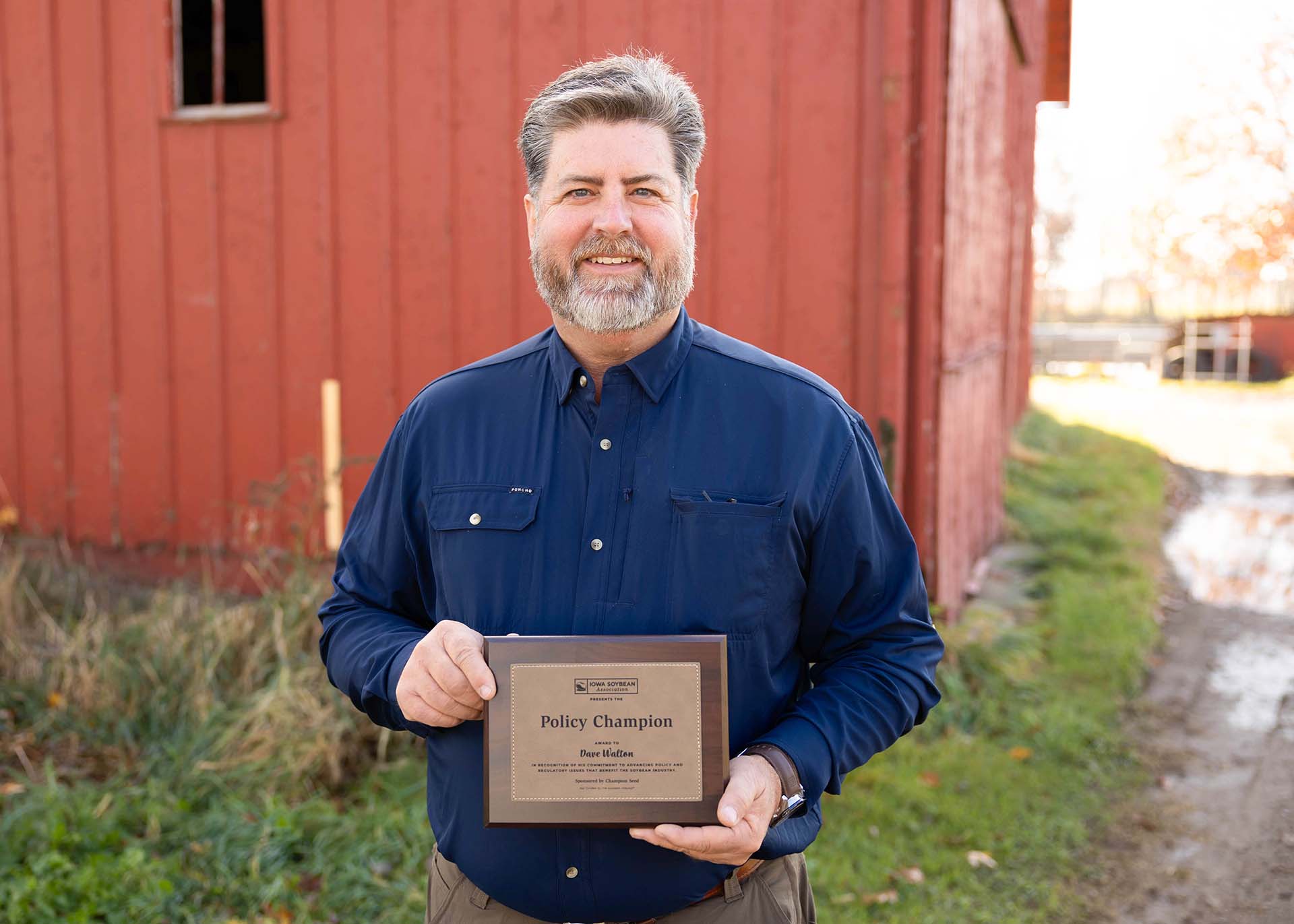
(Photo: Iowa Soybean Association / Joclyn Bushman)
Farmer recognized for efforts in advocating for soybean industry
January 6, 2025 | Bethany Baratta
A seventh-generation farmer and policy champion
Perhaps it’s because his family’s roots run deep in agriculture. They’ve been farming in Iowa since 1835, before Iowa was a state. Maybe it’s his competitive, play-to-win mentality. After all, several of the swimmers he’s coached qualified for the U.S. Olympic Trials; many swam collegiately at Division 1 or private colleges.
Perhaps Dave Walton’s doing it for the eighth generation on his family’s farm, his son, Brad. Maybe it’s a combination of everything.
Each person has a reason they show up and advocate for what they believe in either at the Statehouse in Des Moines or on Capitol Hill in Washington, D.C.

“One of the things that continues to drive me is providing a voice for the 40,000 farmers in Iowa and the half a million soybean farmers in the U.S.,” says Walton, who raises soybeans, corn, wheat and cattle near Wilton. “Not everybody has the time or the ability or the desire to do what we’re doing, but the things that we’re working for are going to affect every single one of them in one way or another.”
Walton, an Iowa Soybean Association (ISA) District 6 director, has been formally advocating for pro-farmer policies for more than a decade. He previously served as an at-large director on ISA’s executive committee. He is a director on the American Soybean Association board of directors. He also serves on the governing board for Clean Fuels Alliance America (formerly the National Biodiesel Board).
Walton was recently named the 2025 ISA Policy Champion. Sponsored by Champion Seed, the award recognizes an ISA Advocate Member who actively participates in advocating for policy and regulatory issues benefiting farmers and the soybean industry and has a proven track record of personally engaging elected leaders on these issues.
“The fact that ISA has thought enough about the work that farmers do on their behalf really speaks volumes to the way they (ISA) views us, that we’re the strength of the organization,” Walton says. “When farmers step forward and put our minds to things, we get a lot of things accomplished. Having this award established by the association is recognition of that.”

So, what three topics are high on the list for Walton in 2025?
Farm bill
About 80% of the farm bill is in food and nutrition; 20% is tied directly to production agriculture. Keeping an inexpensive, reliable food supply is a national security issue. Updates to the reference prices means farmers have a safety net so they can farm one year to the next.
“Reference prices haven’t kept up with some of the commodities, including soybeans, and they certainly haven’t kept up with the rate of inflation,” he says. Also, ensuring that conservation programs work for working lands and we’re not taking land out of production that should stay in production and into the hands of other producers. “If I have to compete with CRP or some other working lands programs for land that my son could farm, that’s problematic. If there are incentives to keep that land in production but farm it in a sustainable way that’s one thing, but paying to take land out of production, that’s something completely different. We want to see those lands stay as working lands and not CRP, where it’s taken out of production.”
Biodiesel
Successful implementation of the 45Z tax credit as part of the Inflation Reduction Act. In anticipation of the 45Z tax credit and its carbon footprint-based approach, there have been record imports of used cooking oil and tallow driven by increased domestic production of renewable diesel. Those feedstocks have lower carbon intensity scores than domestically grown soybeans, giving them an advantage in the market. The combination of carbon intensity-based production and consumption policies across the globe have collectively heightened demand for low carbon feedstocks, displacing soybean oil’s once-dominate position in the U.S. feedstock market.
“We’ve got to get it right. If we get it right, it (soybean oil) continues to be a valuable source of income for farmers. If we don’t, soybean oil goes to a surplus again and drags down the price of soybeans. It’s a complicated conversation, but we’re trying to get the conversations centered around science and facts,” Walton says.
Rulemaking around re-registration of pesticides through the Environmental Protection Agency (EPA)
The EPA evaluates crop protection product labels and registrations. Products must perform as advertised without having adverse impacts on human health or the environment. This includes an evaluation of potential impacts to non-target species, including those listed as endangered. To address potential adverse effects as determined by the EPA, the agency can require changes to uses, rates, application methods and other mitigation measures.
“This is a freedom to operate issue,” Walton says. “Some of the pesticides and insecticides that we use to manage pests in our fields could be taken off the table. We could lose a lot of tools out of our toolbox.”
Back